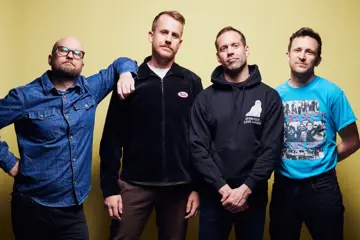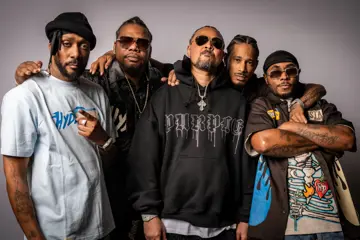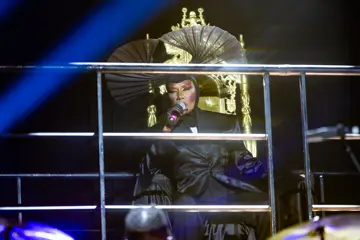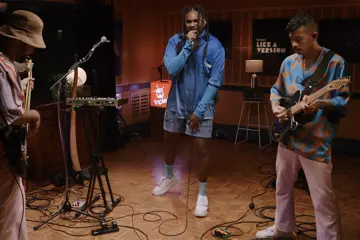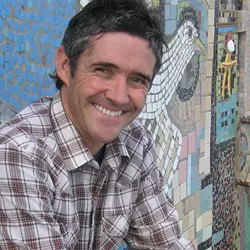 Adam Gibson & The Ark-Ark Birds
Adam Gibson & The Ark-Ark BirdsAdam Gibson’s intrinsically Australian vision – delivered in his inimitable semi-spoken style in that broad Aussie accent – first came to widespread attention back in 2008, with the release of his band The Aerial Maps’ debut album, In The Blinding Sunlight. That collection highlighted both Gibson’s skilful way with words and his unique perception of the Australian way of life and our many cultural strengths and foibles, a skill-set further evinced by that band’s sophomore effort, The Sunset Park. Even though the second album took on more of a narrative structure, much of its power came from Gibson’s deft examinations of the minutiae of local lives and relationships, insights phrased in a manner conducive to the listener both comprehending and connecting with the tales, effortlessly able to draw parallels with their own life experience.
His newest assortment of songs, Australia Restless, rides atop those very same strengths – his compelling worldview, adroit songwriting skills and distinctive delivery – but is this time the product of a new collaboration with a group of friends and Sydney musicians now collectively known as The Ark-Ark Birds. It’s a shift, but not a seismic one, and is basically just the product of Gibson’s fervent desire to get back out there amongst it and not stagnate.
“In a sense The Aerial Maps still exist – and remain in the future an undoubted, ongoing entity – it’s just sort of me putting it on the backburner for the moment, just because the guys involved with that band like Simon Holmes and Sean Kennedy both have a lot of other stuff going on,” he explains. “In a sense, even though it’s thematically and structurally quite similar to what we did in The Aerial Maps, the way it was built was different. I was writing stuff which really felt quite personal, and about my life and stuff that felt really close to me, and I started to pull a lot of that stuff together with my brother Simon. It just evolved in a different way and it didn’t feel like it was The Aerial Maps, so I decided to draw a clear distinction. It’s the same but different. People have got commitments and families and things like that, and I’m keen to get out there and play and do as much as possible, so you just set it up in a bit more of a flexible manner to play live and stuff.”
Even though the content of Australia Restless is so overtly rooted in our wide brown land, a lot of its creation actually transpired a long, long way from home.
“In the last couple of years I’ve been over twice to Finland and Scandinavia,” Gibson continues, “and even though it’s a strange place, (a) to say I even went to, and (b) to write about Australia from, I really felt that sense of distance from Australia gave me a new perspective and I started to write about things that really affected me, whereas with The Aerial Maps stuff a lot of it had been really in situ – in the landscape or in small towns and crossing the desert and that sort of stuff. So probably for me there’s a slight psychological shift, in that even though Australia Restless is very much about – and more explicitly about – Australia than the two Aerial Maps albums, it’s just a slightly different psychological mindset. Again, similar but different.
"Sometimes I’ve never felt more Australian than when I’ve been in London or in Paris or somewhere like that."
Don't miss a beat with our FREE daily newsletter
“I think about people like Hemingway and Kerouac, more so Hemingway – he found that he was able to write about America or write about things which were more culturally American when he was away from there, and I certainly think that’s the case. Sometimes I’ve never felt more Australian than when I’ve been in London or in Paris or somewhere like that – it’s like your personality is reduced and you find those essential elements about yourself. It’s not about bullshit nationalism or even your accent, it’s just your approach to life. But also you really get that distilled image, you’re not overwhelmed by it day to day; I sit here now in Sydney and look out the window and see the sky blah blah blah, but if I’m imagining that from Paris I’m seeing it in such a different mindset and yearning for it and I see it quite clearly, I think.”
Did Gibson know from the get-go that Australia Restless would comprise a series of snapshots rather than the narrative form which served him so well on The Sunset Park?
“Yeah, we did The Sunset Park which was a really interesting exercise to do, and which came from a novel manuscript that I’d written so was a matter of placing the songs in a sense like chapters,” he offers. “It was a great thing to do, and it was emotionally and physically tiring, but for this one I had this idea – this kind of concept – in that I had the title first, Australia Restless. People all along the process have asked, ‘What does that mean? Do you think it’s gonna work?’, but I stuck with it because it’s a real underpinning of the album. I don’t mean to get all wanky about it, but there was a theory or thesis I had behind the whole work, and that’s just this idea of restless movement within Australia. A lot of people don’t even go overseas at all in their whole lives, but they’ll live in five different cities and they move around a lot.
"It’s not about bullshit nationalism."
“So there’s that aspect, but there’s also the aspect that historically with Australia being a European and white settlement, it was characterised by that sense of restless movement that pushed people onto new towns and new places, going right back to the early explorers and the settlement and itinerant workers moving around and working in shearing sheds. Using all of that as a kind of theoretical construct, I built upon it with more modern stories and it essentially became that grab bag of snapshots; as Paul Kelly says [in Bradman], ‘Let the part tell the whole’.
“It’s probably something that has been in the back of my mind, and these things sort of bubble up or you’ll latch onto an idea when you’re writing an album. I like to try and write stuff that at its base has a meaning – I remember a friend saying that she liked everything I’ve done musically because essentially at the core of it was an idea rather than just saying, ‘Let’s just do this song because it’s fun’. So I was looking around thinking, ‘What’s this album going to be?’, and scratching around for different ideas, and then once the title came to me the ideas kind of encrusted around that title – it was a process where the ideas were there, the title took traction and then everything else kind of accumulated around that. Some bits washed away, and some bits stuck.”
There’s something unique about Gibson’s songwriting style that prompts a barrage of memories and recollections of shared experiences, and he attests that this is one of the aims of his creative process.
“I look at some of my early influences, and I’ve always done essentially spoken storytelling, and at the core of that was Jack Kerouac talking with Steve Allen about this very specific world,” he tells. “I don’t know the world that they’re talking about on those albums – I don’t know the physical places – but I’m just absolutely there, and to this day they affect me and I’m moved by them and their specifics. So I just thought that I’d try and write about my own specifics and hopefully that tells the greater whole. It’s funny, I’ll talk about something that’s really close to me or a really personal experience and after a gig someone will come up to me with tears in his eyes and say, ‘Oh, my grandfather used to do that and when you talked about that it was exactly how it used to happen’. So if you try to paint in broad brushstrokes by talking about big themes I think you can kind of run the risk of not really connecting with anyone, but if get really tight on specifics you can hit the mark very strongly with some people. I like to name names and name locations and things like that – put proper nouns on things, rather than just vague specifics – and if you cast the net some people really seem to enjoy that. I don’t do it as a cynical gesture to hook in someone who grew up in, say, Port Macquarie so they feel an affinity with what I do. I don’t know Lowell, Massachusetts that Kerouac wrote about, but I still know that he’s talking about a place that’s home.”
So the intrinsically Australian nature of his work is more a product of Australia being where Gibson is from rather than an actual ambition to have a national feel?
“It’s just where I’m from, this is the accent we speak in and it’s the world that I see,” he proffers. “But I have always thought on a higher, deeper or wider level that Bulli’s as important as Broadway or Fortitude Valley is as valuable as Soho in London – I think we’ve got to give these places credit, and if we don’t who else is going to? It annoys me but doesn’t surprise me that things that are specifically Australian aren’t given a lot of credit, but having said that look at Courtney Barnett who’s killing it now talking about our place sin our accent – that’s absolutely fantastic, I love that.”
From an outsider’s viewpoint there seems to be a deeper lineage happening too – Gibson’s songs contain snippets of other intrinsically Aussie works, such as lines from tracks by artists such as Midnight Oil, Paul Kelly, Weddings Parties Anything and Hunters & Collectors – and he explains that this is mainly just a top of the hat to those who have gone before him.
“It definitely is, but it’s also a little game I like to play, like an aural ‘Where’s Wally?’ – I’ll get the trainspotters to really find those sort of things,” he laughs. “Firstly, it’s not a cynical exercise just to have a connection with those artists – it is a tip of the hat, and also just a fun thing to do. We’ve got such a canon of great stuff, and there are so many great Aussie bands and poems and literature that have influenced me and I like to fit them in. At the end of each gig I can run a test and see who’s got what. Some of them are really tight and really obscure, and every now and then someone will pick one up and I’ll be, like, ‘That was a good spot!’”
"Bulli’s as important as Broadway or Fortitude Valley is as valuable as Soho."
It’s clear from even a cursory listen that there’s a lot of his own self invested in his works, but Gibson explains that the balance between pure fiction and autobiography changes from song to song.
“Yeah, it does shift, and I’ve been in circumstances where people have been completely convinced that a certain part of a story is particular to my life or part of my true experience,” he says. “For example I had a friend of mine who really, really love the first Aerial Maps album, which has a song called The Shark on it where I talk about my sister – equally on the same album I talk about my father who was a big punter and loved a bet – so you could say On The Punt is explicitly true and about my life, but then The Shark is complete fiction, and I don’t have a sister. That really messes with people’s heads a bit. It’s about not giving people completely firm ground to nail me down. I want people to know enough, but I want there to be an element of fiction and the possibility that comes with that. If I just did my life, I’ve covered my Dad, done a bit of surfing and talked about the Roosters and that’s it! I’ve got to expand the palette a bit, mate!”
Of songs on Australia Restless, it seems clear that the epic closer Blanchey (You Were Beautiful) is one of the works that is heavily grounded in reality.
“That one’s very much so,” Gibson admits. “That tells the story of my grandma and how my mum came to Sydney from Melbourne, but even though it is essentially a story about my grandma’s – and by extension my mum’s – life, I really wanted their story to try to tell the story of Australia in the twentieth century. So it’s taking from the early-twentieth century when my grandma was born, right through to the end of it when she died. I’m using my mum and my grandma as a story which is a thread on the Great War and the Depression – the ‘hungry years’ of the Depression to quote the Weddoes – and then going through to the end of the Second World War and Victory In The Pacific Day and moving right out of that to the ‘50s and the ‘70s and Gough Whitlam. In a sense they’re the vehicle through which the story of Australia is carried for that period. Every aspect of that is really, really true but essentially the idea was to tell a bigger story – some people will just get the family story, and others will get that it’s wider, with bigger references going on there. A few people have gotten really emotional from that song – even people who played on it. Even when I tried to have a go at doing it at practice I couldn’t get the whole way through without welling up, so it’s not on the live agenda at the moment; (a) it’s too bloody long, and (b) it’s one of those ones that you don’t want to wear out.”
Another new song which fosters easily connections is The Years Nobody Cared What You Did, a song which manages to cast an eye back over the good old days without getting mired in mere nostalgia.
"You could live in your car out the back of Currumbin Surf Club and no one really cared."
“I think we’ve got to a point now where every single thing you do is monitored or checked or appraised or dissected or searched for motives for why it’s being done by members of the constabulary or by the government or by our friends or relatives or your girlfriend or whatever,” Gibson muses. “I think we used to live a much more unaccounted life, where you were just able to do stuff and not feel as though everyone was worried about it; ‘You can’t do that!’, or ‘Don’t go doing that!’, or ‘What’d you wanna go doing that for?’ You just sort of bloody did things you know? You could live in your car out the back of Currumbin Surf Club and no one really cared, it was just kind of possible.
“People say, ‘Oh, the internet changed everything blah blah blah’, but I think it’s more than that – I think it’s a deeper level where everyone has a sense that they’ve got to have some input into everyone else’s life. It’s like, ‘Just leave me alone mate, I’m happy!’ You could just do things, and I don’t know whether it’s a uniquely Australian thing that we’ve lost, but there just seemed to be more possibilities and happenstance – maybe it’s just when you’re younger that the world seems a bit more like that? I think it’s more of a societal thing though, where everyone’s a bit more accountable these days. The idea for that actually came from that song by The Go-Betweens, Surfing Magazines, where [Robert Forster’s] talking about being, ‘the type of people that authorities can’t reach’. Not that it directly came from that, but it psychologically stemmed from that; ‘Going to get a kombi and go from beach to beach/Be the type of person the authorities can’t reach’. You can see that connection there. It’s a funny kind of restrictive world we seem to live in, but it ain’t all bad.
“Maybe a lot of the album’s about that older sensibility – not in terms of being physically older or people growing older, but in terms of an older world. But on the other hand I don’t want to be always looking backwards and going, ‘Things were better then’; I don’t want to be painted into that spot of always banging on about the olden days. I think there were aspects which were good and aspects which were bad.”
One of the new album’s most memorable lines comes during Long Time Dead, when he espouses that, “they weren’t better days, just younger ones”.
"If you keep saying how everything was better then and the music was better then and everything was much brighter or whatever – it’s only because you were younger that that was the case."
“That’s exactly what I meant, and that whole idea does underpin the album,” Gibson says. “I have been accused of looking backwards in the past; one of the reviews of The Aerial Maps’ first album In The Blinding Sunlight was titled In Yesterday’s Blinding Sunlight, and I was, like, (a) fuck you, and (b) you missed the point! That whole album was about that whole nostalgic backyard fence world, and the reviewer obviously didn’t get the point that it was a conceptual piece looking at a certain place and time in a psychological. I did say, ‘They weren’t better days, just younger ones’, and the sooner you realise that the better it is for everyone. People are always going on about, ‘Oh, it was better back then’, and ‘Before the internet it was this and that’ – it was alright, but there were still plenty of dramas. That’s a plea, saying that you’re just giving up if you keep saying how everything was better then and the music was better then and everything was much brighter or whatever – it’s only because you were younger that that was the case. Move on, stick with it, keep doing exercise and keep looking forward rather than looking back.”
Now that Australia Restless has been birthed into the world, it’s time for The Ark-Ark Birds to take the album on the road and Gibson couldn’t be happier.
“People sometimes think that because it’s a spoken-word sorta thing that we don’t really play it live, but all these songs were built to be played live, and I think in a live context – once people get over the fact that I’m not singing at them and they understand that – then they can go with it,” he gushes. “The band’s sounding really good, and we’re trying to go back to a sensibility of that oral tradition of storytelling where people gather around in a room – or around a fire – and gather in really close to hear a few yarns about this place or that; that’s the idea. I certainly think that it does work in a live context, and we’re really stoked that we’ve got the opportunity coming up to do that.”
Has he experienced much resistance to the spoken-word aspect of his art when he’s been performing live in the past?
“Yeah it’s funny, I came from a band background – I played in different bands for a long while before I ever vocalised anything, just writing songs and playing bass or whatever – but concurrently with that I did a lot of spoken word stuff in Sydney, and that was originally my lineage,” Gibson smiles. “Then I started to marry the two and do the band stuff with the spoken word, so in my mind I always saw what I did as songs and approached it as a band kind of thing – it’s more sometimes about creating the perception that it is a band and they are songs and don’t be scared. I do speak them but it’s not The Rime Of The Ancient Mariner, it’s not heavy poetry or TS Eliot’s The Love Song Of J. Alfred Prufrock – people might use the word poetry in relation to it but I see it more just as lyrics anyway, just spoken. I’ve seen people at our gig to watch the support bands or whatever, and after to or three of our songs they quietly gather their jacket and bag and kinda slide out sideways – it’s always about the third song when they realise ‘this bloke’s not gonna sing’. I always make sure to mention them from the microphone, like, ‘We’ve cleared better rooms than this so I’ll see you later!’ But once people sit back and don’t resist – God, that sounds bad! – but just go with it and put down those barriers, it usually ends up okay. Mate, I hated poetry at school, you couldn’t me out of that English class quick enough when poetry was mentioned so don’t worry, I understand: ‘Just relax, it’s going to be alright’.”



